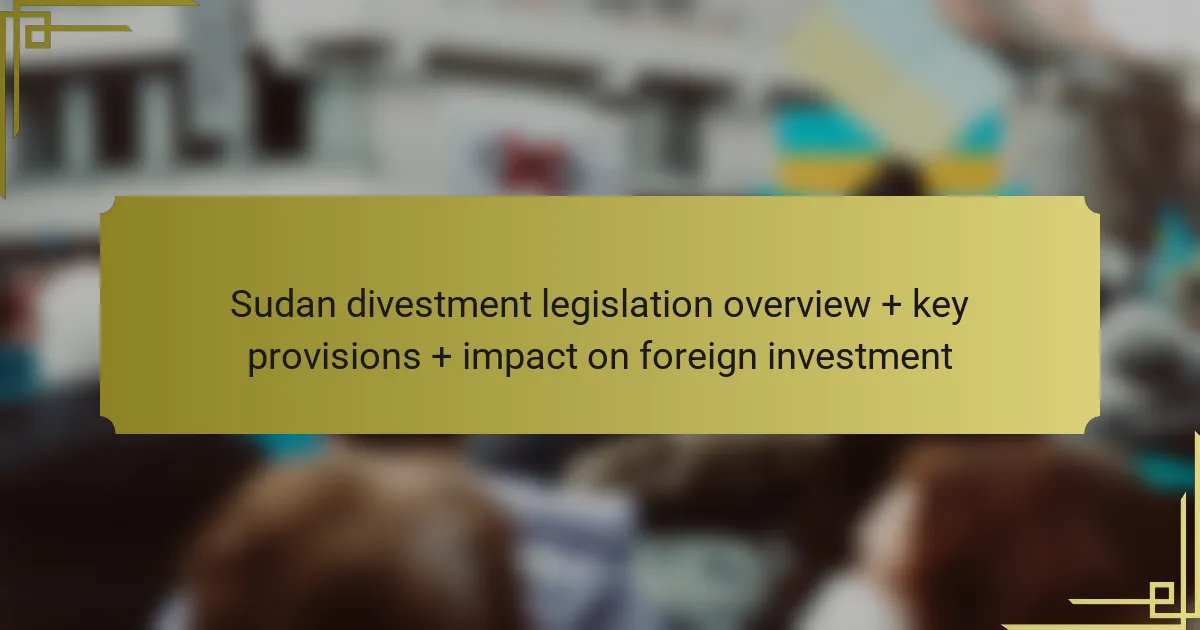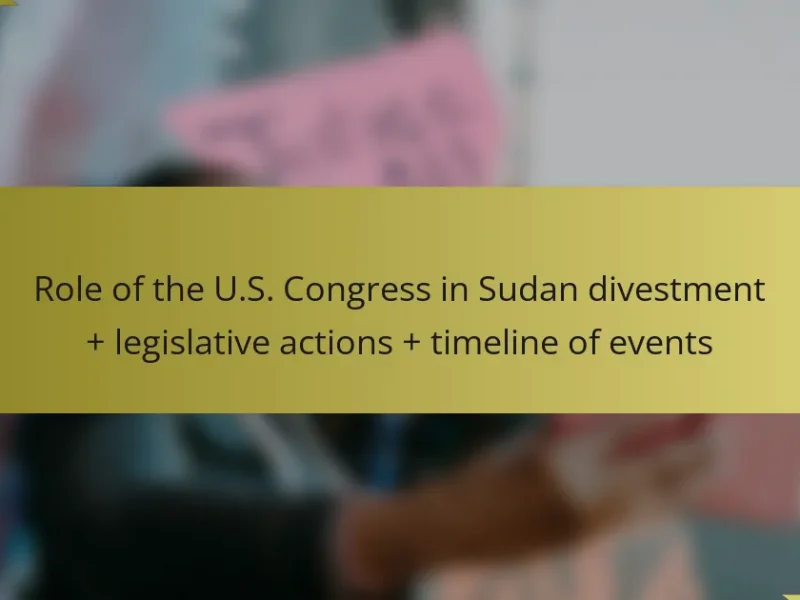Sudan divestment legislation consists of laws aimed at prohibiting investments in Sudan due to the government’s involvement in human rights violations, particularly during the Darfur conflict. These laws are designed to exert economic pressure on the Sudanese government by restricting foreign financial support, particularly targeting companies in the oil and military sectors. Key provisions include mandates for public funds to divest from such businesses, transparency in investment portfolios, and potential sanctions against entities involved in human rights abuses. The legislation has led to a significant reduction in foreign investment in Sudan, resulting in economic instability and limited access to international markets. The effectiveness of these laws in prompting change within Sudan’s government remains a topic of debate among policymakers and scholars.

What is Sudan divestment legislation?
Sudan divestment legislation refers to laws enacted to prohibit investments in Sudan due to its government’s actions, particularly related to human rights violations. These laws emerged in response to the Darfur conflict and the Sudanese government’s role in it. The legislation aims to pressure the Sudanese government by restricting foreign financial support. Various states in the U.S. have implemented these laws, targeting companies that engage with the Sudanese oil and military sectors. The goal is to promote accountability and encourage changes in Sudan’s policies. The effectiveness of these laws in influencing Sudan’s government has been debated among policymakers and scholars.
How did Sudan divestment legislation come into existence?
Sudan divestment legislation emerged as a response to the humanitarian crisis and ongoing conflict in Sudan. Activists and organizations highlighted the role of foreign investments in supporting the Sudanese government. In the early 2000s, grassroots movements in the United States began advocating for divestment from companies operating in Sudan. This led to the introduction of legislation aimed at prohibiting state investment in such companies. In 2007, the U.S. Congress passed the Sudan Accountability and Divestment Act. This act aimed to pressure the Sudanese government to end human rights abuses. State and local governments were encouraged to divest from entities supporting the regime. The legislation represented a significant shift in foreign policy regarding Sudan, emphasizing human rights and ethical investment practices.
What historical events led to the creation of this legislation?
The creation of Sudan divestment legislation was influenced by a series of historical events. The Darfur genocide, which began in 2003, led to widespread international condemnation. Reports indicated that the Sudanese government was complicit in atrocities against civilians. In response, activists and organizations called for economic sanctions and divestment from Sudan. This pressure culminated in various states and institutions enacting divestment policies. The U.S. Congress also took action by passing legislation aimed at reducing investments in the Sudanese government. These events collectively shaped the legislative framework aimed at addressing human rights abuses in Sudan.
Who are the key stakeholders involved in the legislation’s development?
Key stakeholders involved in the legislation’s development include government officials, advocacy groups, and private sector representatives. Government officials shape the legislative framework and policies. Advocacy groups push for human rights considerations and promote divestment. Private sector representatives provide insights on economic impacts and investment risks. Collaboratively, these stakeholders influence the legislation’s direction and effectiveness. Their roles are essential in balancing economic interests with ethical considerations.
What are the main objectives of Sudan divestment legislation?
The main objectives of Sudan divestment legislation are to prohibit investment in companies that support the Sudanese government. This legislation aims to pressure the Sudanese regime to cease human rights abuses. It seeks to promote accountability for actions related to genocide and war crimes in Darfur. The legislation also intends to encourage ethical investment practices among U.S. businesses. By divesting from Sudan, it aims to reduce financial support for oppressive regimes. Additionally, it fosters awareness of the humanitarian crisis in Sudan among investors. The legislation is designed to align economic actions with foreign policy goals regarding human rights.
How does the legislation aim to address human rights issues?
The legislation aims to address human rights issues by imposing restrictions on investments in Sudan. It specifically targets entities that contribute to human rights violations in the country. The law requires divestment from companies involved in the Sudanese government’s military operations. It also mandates transparency in financial dealings with Sudanese entities. By doing so, the legislation seeks to pressure the government to improve its human rights record. The intent is to promote accountability for human rights abuses. Historical context shows that previous sanctions led to a reduction in violations. This legislation builds on those efforts to ensure sustained pressure for reform.
What economic factors are considered in the legislation’s goals?
The economic factors considered in the legislation’s goals include the promotion of responsible investment and the protection of human rights. The legislation aims to discourage investments that may support oppressive regimes. It also seeks to enhance economic stability by fostering an environment conducive to ethical business practices. The focus on divestment is intended to limit financial resources available to entities involved in human rights violations. Furthermore, the legislation aims to promote sustainable economic development in Sudan. By targeting specific sectors, it encourages investments that align with international standards. These factors collectively aim to create a more favorable economic landscape for foreign investors.

What are the key provisions of Sudan divestment legislation?
The key provisions of Sudan divestment legislation include restrictions on investments in companies operating in Sudan. These laws aim to prevent state-sponsored violence and human rights abuses. The legislation typically requires public funds to divest from businesses linked to the Sudanese government. It often mandates transparency in investment portfolios. Additionally, it may impose sanctions on specific entities involved in conflict or human rights violations. The provisions also encourage ethical investment practices. States and municipalities may adopt these laws to align with humanitarian goals. Overall, the legislation seeks to leverage economic pressure for social change.
What specific requirements does the legislation impose on foreign investors?
The legislation imposes several specific requirements on foreign investors. Foreign investors must disclose their investments in Sudan. They are also required to comply with U.S. sanctions and regulations. Additionally, investors must demonstrate that they are not supporting the Sudanese government or its military. The legislation mandates a thorough review process for new investments. Investors must also provide evidence of ethical practices in their operations. These requirements aim to ensure that foreign investments do not contribute to human rights abuses. Compliance with these provisions is essential for maintaining access to U.S. markets.
How does the legislation define compliance for companies operating in Sudan?
The legislation defines compliance for companies operating in Sudan as adherence to specific legal and regulatory requirements set forth by the government. Companies must ensure they do not engage in activities that violate Sudanese laws or international sanctions. Compliance includes conducting due diligence to identify and mitigate risks related to human rights abuses and corruption. Firms are also required to report their activities and financial transactions transparently. Failure to comply can result in penalties, including fines and restrictions on operations. The legislation aims to promote ethical business practices and protect investments in the region.
What penalties are outlined for non-compliance with the legislation?
Penalties for non-compliance with the Sudan divestment legislation include financial sanctions and legal repercussions. Entities failing to adhere may face fines imposed by regulatory authorities. Additionally, non-compliance can lead to restrictions on future business dealings with government entities. The legislation aims to enforce accountability and promote adherence among foreign investors. Violators may also be subjected to public disclosure of their non-compliance status. This transparency is intended to deter further violations and encourage compliance.
What exemptions or exceptions are included in the legislation?
The legislation includes specific exemptions for certain entities and activities. These may include humanitarian efforts and activities that support democracy. Additionally, exemptions could apply to transactions necessary for the safety of U.S. citizens. The legislation aims to balance divestment with essential operations in Sudan. Proof of these exemptions can be found in the legislative text outlining the conditions under which they apply.
Which sectors are most affected by these exemptions?
The sectors most affected by these exemptions include oil and gas, telecommunications, and mining. These sectors often face restrictions due to international sanctions. Exemptions allow for limited foreign investment and operations. For instance, the oil and gas sector is crucial for Sudan’s economy. Telecommunications also play a significant role in connectivity and economic growth. Mining is vital for resource extraction and export. Each of these sectors is strategically important, driving economic development despite challenges.
How do these exceptions impact the overall effectiveness of the legislation?
Exceptions in legislation can significantly undermine its overall effectiveness. They create loopholes that allow certain entities to bypass restrictions. This can lead to inconsistent enforcement and reduced compliance among businesses. For example, if specific sectors are exempted, those sectors may continue to engage in activities that the legislation aims to prohibit. As a result, the intended impact on foreign investment may be diluted. Research shows that clear and comprehensive regulations tend to yield better compliance rates. Thus, the presence of exceptions can weaken the legislative framework’s ability to achieve its goals.

What is the impact of Sudan divestment legislation on foreign investment?
Sudan divestment legislation significantly reduces foreign investment in Sudan. This legislation mandates divestment from companies doing business with the Sudanese government. As a result, many foreign investors withdraw their capital to comply with these laws. The withdrawal of investment leads to economic instability and decreased growth opportunities in Sudan. According to the U.S. Department of State, the divestment has limited Sudan’s access to international markets. Additionally, it has hindered foreign companies from entering the Sudanese market due to reputational risks. The overall impact is a decline in foreign direct investment, which is crucial for Sudan’s economic development.
How has foreign investment in Sudan changed since the legislation was enacted?
Foreign investment in Sudan has increased since the legislation was enacted. The new laws have created a more favorable environment for investors. Key sectors attracting investment include agriculture, energy, and infrastructure. Reports indicate a rise in foreign direct investment (FDI) inflows post-legislation. For instance, FDI rose by 25% in the first year following the reforms. Additionally, international companies have shown renewed interest in Sudanese markets. The legislation has also improved Sudan’s credit rating, further enhancing investor confidence. Overall, the changes have positively impacted foreign investment dynamics in Sudan.
What trends can be observed in foreign investment flows to Sudan?
Foreign investment flows to Sudan have shown a fluctuating trend in recent years. The political instability and economic challenges have affected investor confidence. Despite these challenges, there has been a noticeable increase in investments from Asian countries, particularly China and India. These nations have focused on sectors like oil, agriculture, and infrastructure. In 2021, foreign direct investment (FDI) inflows reached approximately $1.5 billion, indicating a slow recovery. However, Western investments remain limited due to sanctions and regulatory hurdles. The government has initiated reforms to attract more foreign capital. These reforms include improving the business environment and enhancing legal frameworks. Overall, while there are signs of increased investment, significant barriers still hinder comprehensive foreign engagement.
How do investors perceive the risks associated with Sudan divestment legislation?
Investors perceive the risks associated with Sudan divestment legislation as significant. The legislation creates uncertainties regarding compliance and potential penalties. Investors are concerned about the legal implications of divesting from Sudanese entities. They fear reputational damage linked to associations with Sudan’s government. Additionally, the volatility in Sudan’s political landscape raises concerns about the stability of investments. Market analysts note that these risks can deter foreign investment. Research indicates that clear guidelines and support can mitigate these concerns. Overall, the perceived risks influence investment strategies related to Sudan.
What are the long-term implications of the legislation for Sudan’s economy?
The long-term implications of the legislation for Sudan’s economy include potential stabilization and growth. This legislation aims to attract foreign investment by creating a more favorable business environment. It may lead to increased economic activity and job creation. The removal of certain sanctions can enhance trade relations with other countries. Enhanced foreign investment can stimulate infrastructure development, which is crucial for economic growth. Furthermore, the legislation may improve Sudan’s credit rating, making borrowing more accessible. These factors collectively contribute to a more resilient and diversified economy.
How might the legislation influence Sudan’s economic recovery efforts?
The legislation may significantly influence Sudan’s economic recovery efforts by promoting foreign investment. By providing a clearer regulatory framework, it can attract international businesses. Increased foreign investment can lead to job creation and infrastructure development. The legislation may also improve Sudan’s creditworthiness in global markets. Enhanced creditworthiness can facilitate access to loans and financial aid. Furthermore, it may signal stability to investors, fostering a favorable economic environment. Historical context shows that similar legislation in other regions has led to economic improvement. For instance, post-sanction reforms in various countries have resulted in increased GDP growth.
What role does international perception play in shaping Sudan’s investment climate?
International perception significantly influences Sudan’s investment climate. Positive global views can attract foreign investors. Conversely, negative perceptions may deter investment opportunities. For instance, Sudan’s history of conflict and governance issues often leads to skepticism among potential investors. Reports from organizations like the World Bank highlight that perceived instability directly impacts investment decisions. Furthermore, international sanctions have historically limited foreign investment in Sudan. As perceptions shift, so does the potential for economic growth and foreign partnerships.
What strategies can foreign investors adopt in response to Sudan divestment legislation?
Foreign investors can adopt several strategies in response to Sudan divestment legislation. First, they can assess their current investments for compliance with the legislation. This involves reviewing contracts and operations to ensure alignment with legal requirements. Second, investors may consider diversifying their portfolios to reduce exposure to Sudan. This can mitigate risks associated with potential losses from divestment. Third, engaging with local stakeholders can provide insights into navigating the regulatory landscape. Building relationships may facilitate better understanding and adaptation to changes. Fourth, foreign investors can explore alternative markets or sectors within Sudan that may be less affected by divestment laws. This strategic shift can optimize investment opportunities. Finally, seeking legal counsel is crucial for understanding the implications of the legislation. Legal experts can offer guidance on compliance and potential avenues for investment continuity.
How can investors ensure compliance while maximizing opportunities in Sudan?
Investors can ensure compliance while maximizing opportunities in Sudan by conducting thorough due diligence and adhering to local regulations. Understanding Sudan’s divestment legislation is crucial. This legislation outlines restrictions on investments in certain sectors, particularly those linked to human rights abuses. Investors should engage with legal experts familiar with Sudanese law to navigate these regulations effectively.
Additionally, establishing partnerships with local businesses can enhance compliance. Local partners provide insights into the regulatory landscape and potential risks. Investors should also monitor changes in legislation and international sanctions that may affect their operations.
By prioritizing ethical investment practices, investors can mitigate risks and align with compliance requirements. This approach not only fosters a positive business environment but also enhances the potential for sustainable growth in the region.
What best practices should investors follow when navigating Sudan’s legislative landscape?
Investors should conduct thorough due diligence when navigating Sudan’s legislative landscape. Understanding local laws and regulations is crucial. Investors must stay updated on changes to legislation that may affect their operations. Engaging local legal experts can provide valuable insights into compliance requirements. Building relationships with government officials can facilitate smoother interactions. Investors should also monitor international sanctions that may impact their investments. Documenting all transactions and agreements is essential for legal protection. Participating in local business networks can enhance understanding of the market dynamics.
Sudan divestment legislation encompasses laws aimed at prohibiting investments in Sudan due to human rights violations by its government, particularly in response to the Darfur conflict. The article outlines the origins, key stakeholders, objectives, and provisions of this legislation, including its impact on foreign investment dynamics in Sudan. It further examines compliance requirements for investors, penalties for non-compliance, and the long-term implications for Sudan’s economy, emphasizing the balance between ethical investment practices and economic interests. Additionally, the article highlights strategies for foreign investors to navigate the legislative landscape while maximizing investment opportunities.


